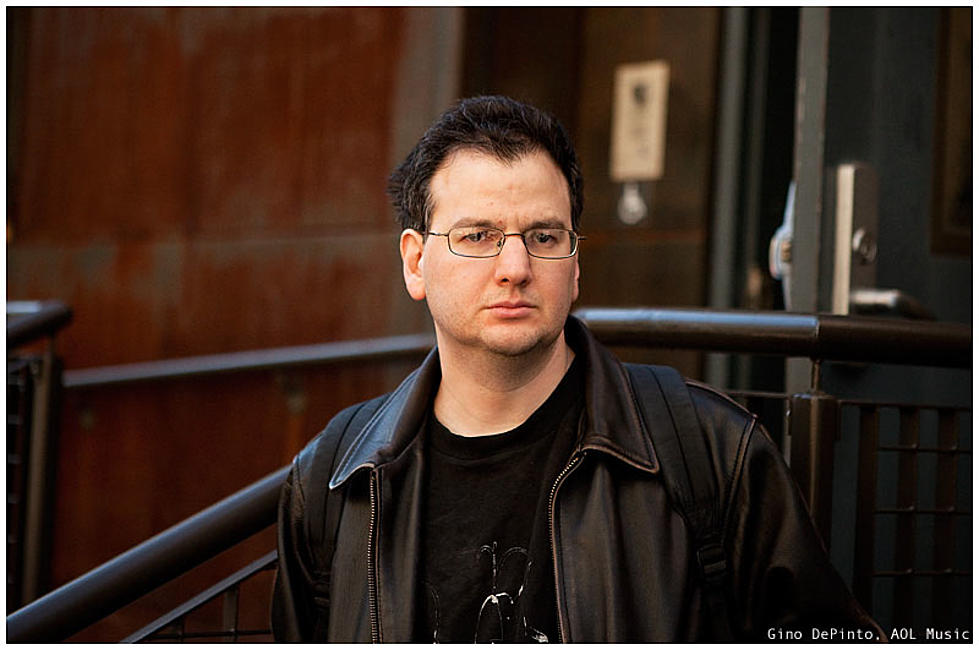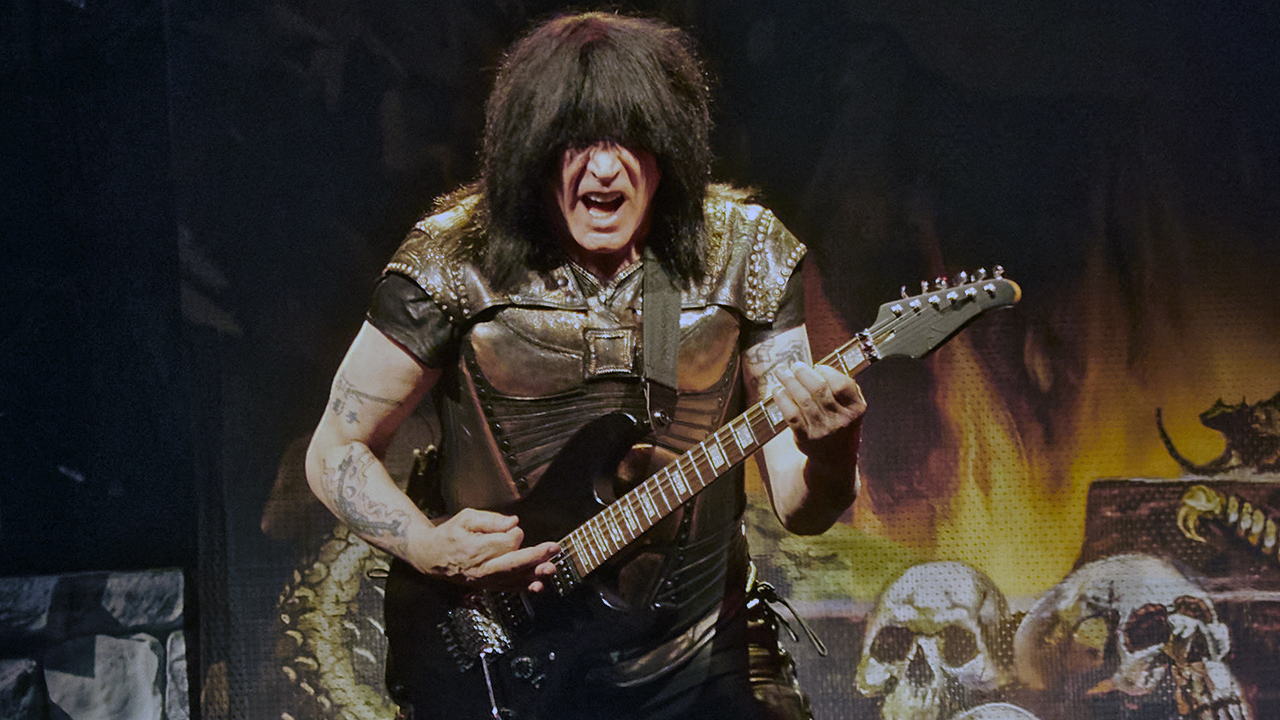“Me not being in Slayer sucks. I want Slayer to exist. This is the only way I know how to do that”: Thrash icon Kerry King on flying solo, the reunion shows that were never going to happen – and why he doesn’t demo with modelers
Kerry King takes us behind the making of From Hell I Rise, the thrash album of the year and the comeback of a metal icon who has every intention to keep on slaying, Slayer or no Slayer
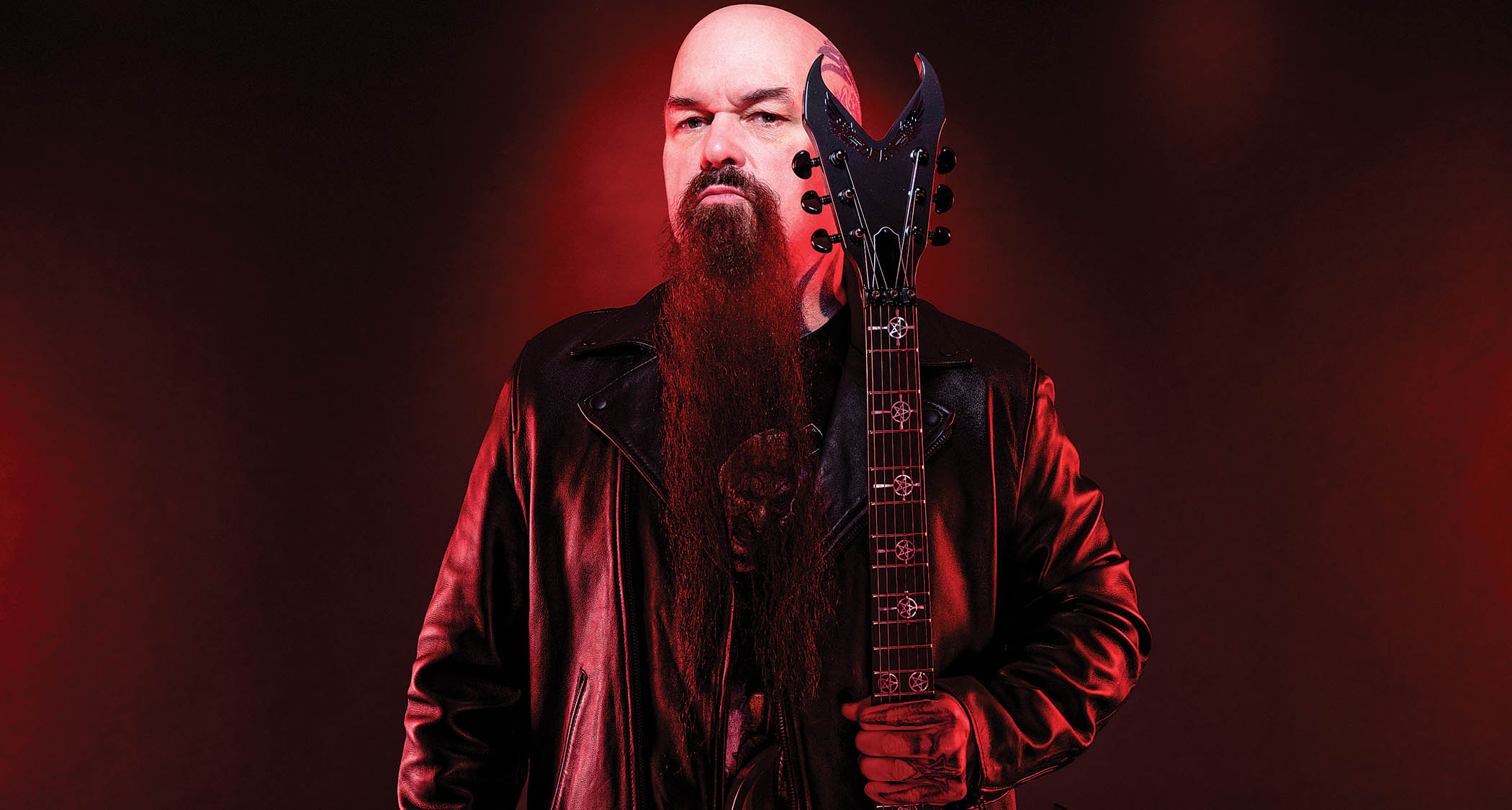
All the latest guitar news, interviews, lessons, reviews, deals and more, direct to your inbox!
You are now subscribed
Your newsletter sign-up was successful
After more than 35 years living on the West Coast and pouring all of his musical energy into a single band, Slayer co-founder and guitarist Kerry King is now in a different place – literally. In 2020, King and his wife Ayesha packed up their stuff and relocated to Tribeca in New York City.
“My wife is from here,” says King from the back table of the New York Tex Mex restaurant and bar Cowgirl SeaHorse in Lower Manhattan.
“She had a 20-year exile to the West Coast with me, so now it’s my turn. But I like it here, and it was good timing because we moved here during the pandemic, so I got way more for my money than I should have. I would’ve bought two places had I known that. The places in my building have gone up exponentially since then.”
Of course, moving to New York isn’t the only major change in King’s life. After wrapping up their farewell tour in 2019, Slayer, the band King co-founded in 1981, was gone. Maybe to minimize the mourning process, King formed a new band just months later and started over. And he has started over. To all intents and purposes, Slayer’s final lineup (if not their sound) is but a blip on King’s radar.
Granted, it’s a big blip, and one that will likely generate more increased valuation than his Manhattan apartment when Slayer play three scheduled festival reunion shows later this year. Even so, the band’s last-standing songwriter will spend the vast majority of the foreseeable future not with Slayer, but playing live and recording new music with his new band, entitled Kerry King.
Their debut record, From Hell I Rise, is a savage gut-punch of instantly recognizable riffs, jackhammer beats and disarmingly familiar vocals. In other words, fans of Slayer’s early classics Reign in Blood, South of Heaven and Seasons in the Abyss will find plenty to love in the tunes, tones and delivery of King’s new album. Though he’s switched from B.C. Rich to Dean Guitars, not much else has changed only the names of half the players.
From Hell I Rise is flush with rapid-fire thrash rhythms, chromatic guitar riffs and blazing leads, with songs that vary in tone from eerie and atmospheric to savage and torrential. Diablo/Where I Rise is driven by quick chord changes in the verse and an elongated riff for the chorus. Then it bursts into a galloping midsection that’s bound to cause havoc in the mosh pit.
All the latest guitar news, interviews, lessons, reviews, deals and more, direct to your inbox!
Idle Hands is an off-kilter thrash-fest that cuts and chugs like a train with razor-sharp wheels. And Crucifixation sounds like hardcore-influenced Slayer songs (Jesus Saves, Disciple) crossed with the harmonized, minor-key savagery of some of the band’s slower, eerier material (Dead Skin Mask).
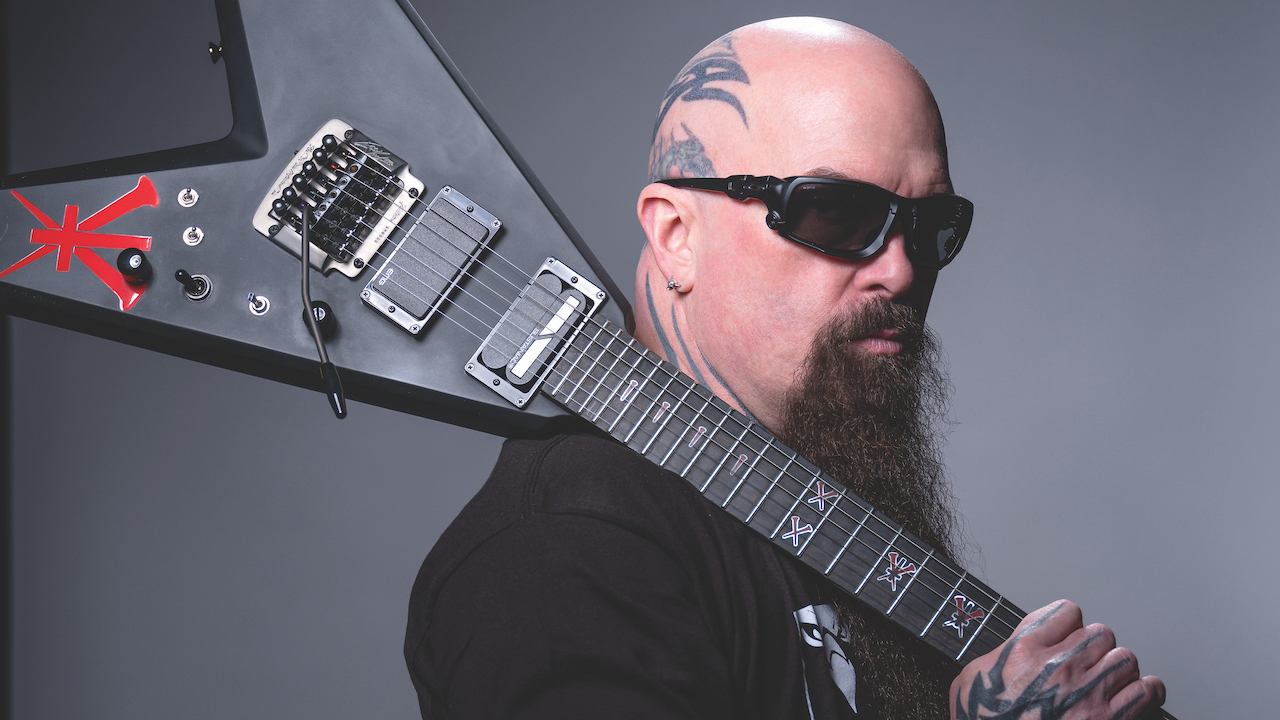
“I call Crucifixation the money shot ’cause it’s just so relentless,” King says with a smile. “To me, it sounds like big-time Eighties thrash. It goes from sheer fury to this big, heavy drum break, to super-groove, then back to sheer fury.”
Songs like Crucifixation and Tension, which include the type of haunting atmospheres that were part of late guitarist Jeff Hanneman’s repertoire, should silence the naysayers who still credit Hanneman with writing Slayer’s most harrowing and memorable songs.
“I kind of worried about that [in 2014], when I wrote the last Slayer album, Repentless, [after Jeff passed] because he usually did the spooky-sounding stuff,” King says.
“Then I did When the Stillness Comes for Repentless, and I’m like, ‘Okay, I’ve got spooky down.’ I wanted to show the world that whatever Jeff usually infuses into the band, I’ve got covered. So, with this new album, I don’t think I have to worry about anything sounding like Slayer. I mean, fuck! That’s what it should sound like.”
King’s not downplaying the contributions of his former bandmate. He still tells stories about the early days of meeting Hanneman when he was working as a doorman in a hotel, and how they combined their individual interests in punk (Hanneman) and traditional metal (King) to form the heaviest, most evil-sounding band of the Big 4 thrash scene.
Tragically, 32 years/11 albums later, Hanneman died on May 2, 2013, from alcohol-related cirrhosis of the liver. King believes his bandmate’s excessive drinking increased after 2011, when he contracted a flesh-eating disease necrotizing fasciitis from a suspected spider bite and was unable to continue playing in the band.
Slayer hired Exodus main man Gary Holt to replace Hanneman, and the lineup change widened the already existing gulf between King and vocalist/bassist Tom Araya.
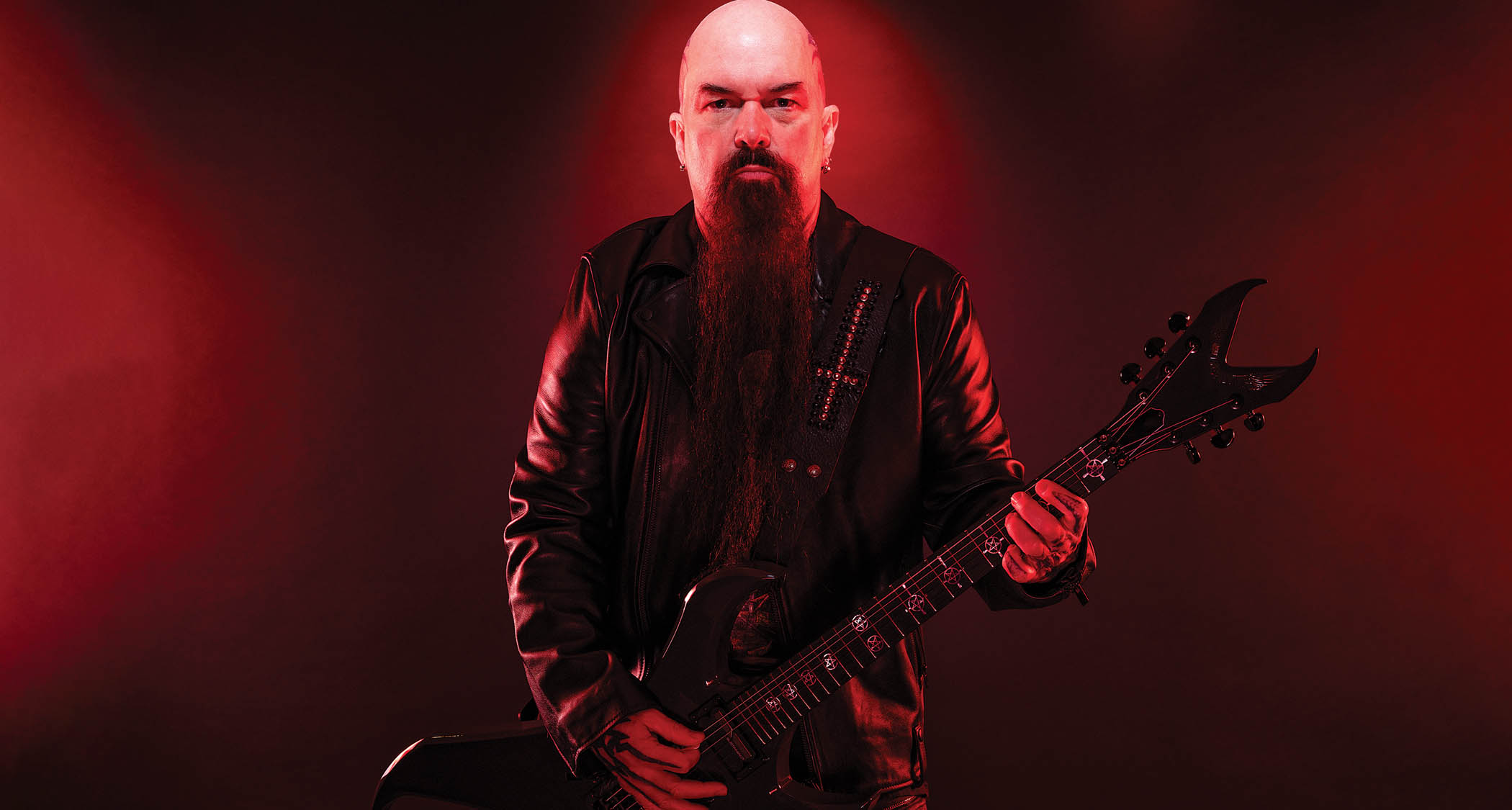
“If Jeff was still here, would there be another Slayer record?,” rhetorically asks King, picking at the tortilla chips on his plate.
“Who knows? I mean, Jeff weighed on Tom a lot, and I think Jeff not being around had a lot to do with Tom leaving Slayer. But, you know, if that fucking dumb-ass Jeff was still here, he’d be wanting us to play. I know he would. And if I played this album for Jeff, he would fuckin’ love it.”
if I played this album for Jeff, he would f***in’ love it
Without Hanneman around, King became Slayer’s only songwriter and remains the band’s voice and mouthpiece. The second guitarist on From Hell I Rise is ex-Machine Head and former Vio-Lence guitarist Phil Demmel (who has also filled in on tour for Overkill, Lamb of God and, yes, Slayer). Demmel’s leads are melodic and less frantic than those of King or Holt, yet his tone is all Slayer.
At the risk of being redundant, From Hell I Rise is nothing short of Slayer reborn. And that’s hardly a crime, since it’s exactly what King wanted; and it explains why he originally wanted to call the band King’s Reign or Blood Rain (references to Slayer’s most heralded album, 1986’s Reign in Blood). Both names were already trademarked. With From Hell I Rise, King pulls no punches. Neither does he provide any strikingly new combinations.
Me not being in Slayer sucks. I want Slayer to exist, so this is the only way I know how to do that
“I can only write the way I write,” he says with a shrug, then takes a pull from his glass of tequila. “That’s all I know how to do. That’s all I want to do. I mean, me not being in Slayer sucks. I want Slayer to exist, so this is the only way I know how to do that.
“To me, it would be weird to do anything else. Everybody knows how I write. This is my comfort zone. I’m a big metal guy. I don’t want to make rock ’n’ roll. I don’t want to make anything else. If people say this album sounds like Slayer, I take that as a huge compliment.”
King started working on From Hell I Rise in February 2020, after the Super Bowl (he has always been a huge football fan). He finished writing the album long before he knew about any Slayer reunion shows (the band’s final full tour ran through 2019). And because he wrote them, King used leftover Slayer songs on the record.
Then, when Kerry King finished tracking From Hell I Rise, King and ex-Slayer drummer Paul Bostaph kept working on new songs for their second album, which is mostly written.
King was so laser-focused on his new project that he hasn’t spoken with Araya or texted his former bandmate since the Slayer’s farewell tour ended at the LA Forum on November 30, 2019. To be fair, Araya didn’t try to contact King either… Then came February 21, 2024.
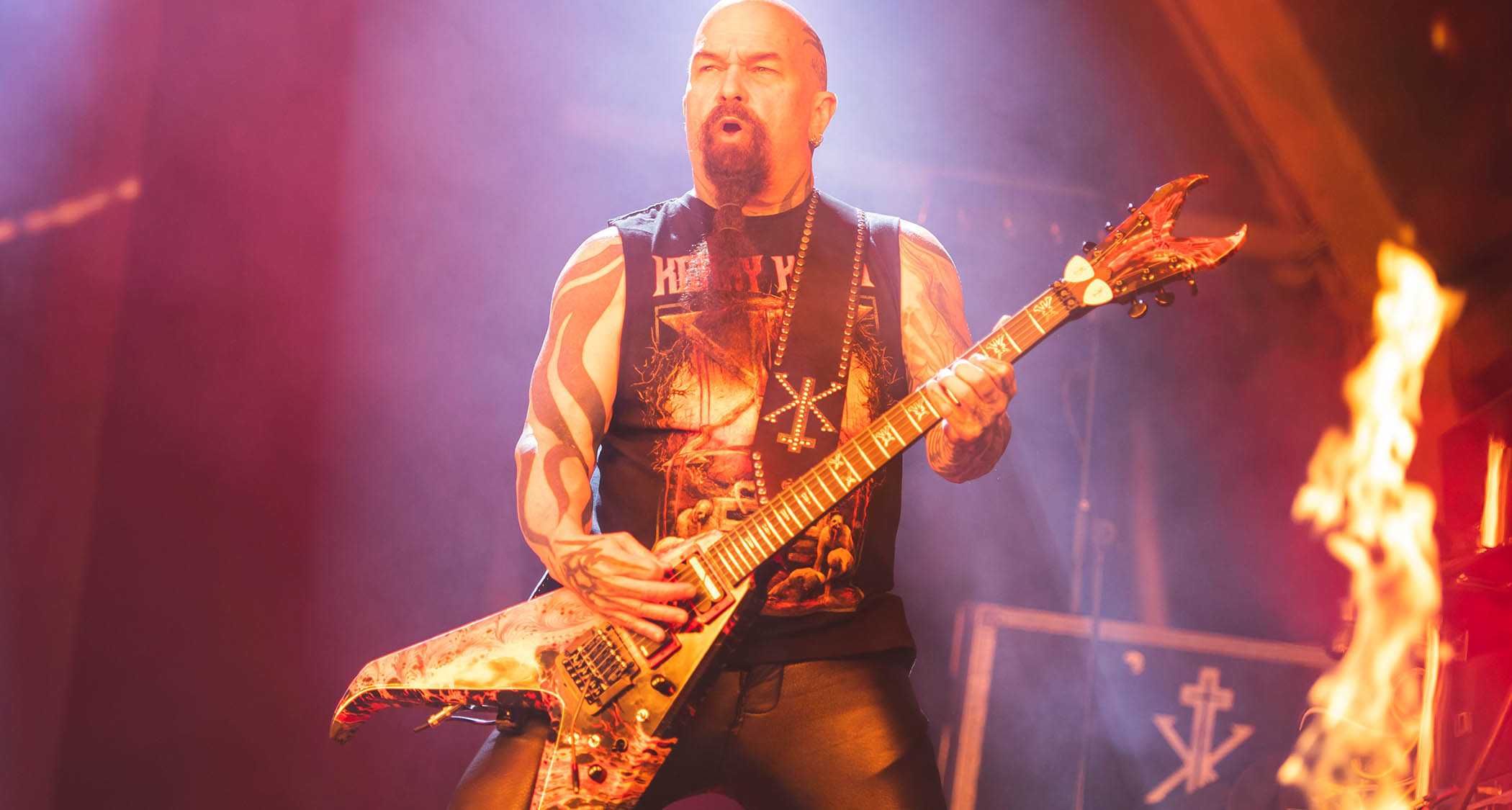
That morning, just 16 days after Rolling Stone posted an interview with King in which he stated that he didn’t see eye to eye with Araya, and how there would never be a Slayer reunion, the band issued a press release confirming that Slayer would reunite to headline a pair of festivals, Riot Fest in Chicago on September 22 and Louder Than Life in Louisville, Kentucky, on September 27.
A week after the news broke, Slayer announced they would also headline the Aftershock Festival on October 10 in Sacramento, California. All three shows would feature the lineup from Slayer’s final album, Repentless Araya, King, Bostaph and Holt. King says shows were put together by Slayer’s management and Araya’s wife, and for him, it was like Hell freezing over.
“I was very surprised,” King says in an exclusive statement to Guitar World about a week after his interview for our cover story.
“I made my comments [about Slayer being finished] based on [Tom] not wanting to play anymore. As far as I was concerned, we were done and never going to play again. To be honest, I don’t know what switched.
“We’ve been turning down offers to play shows for at least three years. So, one came up that, I guess, enticed Tom to the point where he wanted to roll the dice and try a couple. I don’t know, but that’s all it is.”
Now, with Pandora’s box reopened, King is looking forward to playing three more stadium shows with Slayer, with huge crowds and requisite pyro. “I’ve really missed fire!” he says, and adds that he’d be open to, maybe, an additional Slayer gig.
“There could be an instance where there’s another one-off,” he says. “It just has to be the right offer at the right time, maybe someplace everybody loves to go. But touring, no, I don’t see touring. But, you know, who’s to say a one-off can’t happen again?”
I’m not looking to do any more music with Slayer at all,. Not because of any dislike, but because we made that statement that we’re not going to tour anymore
As excited as he is to feel the flames of a giant burning Slayer logo on his back again, King is more stoked about the combustive excitement building around his new album and the tour to support it. The band will play two warm-up shows in May, and then seven cities in Europe in June.
The proper tour launches on July 19 in Grand Prairie, Texas. In between runs, King and Bostaph may work on more new songs for the follow-up to From Hell I Rise. One thing’s certain: none of the songs King has completed since his first Kerry King album, nor anything he writes in the future will be used for a future Slayer album. King’s days of recording with Araya are in the past, and the guitarist has both eyes focused on the road ahead.
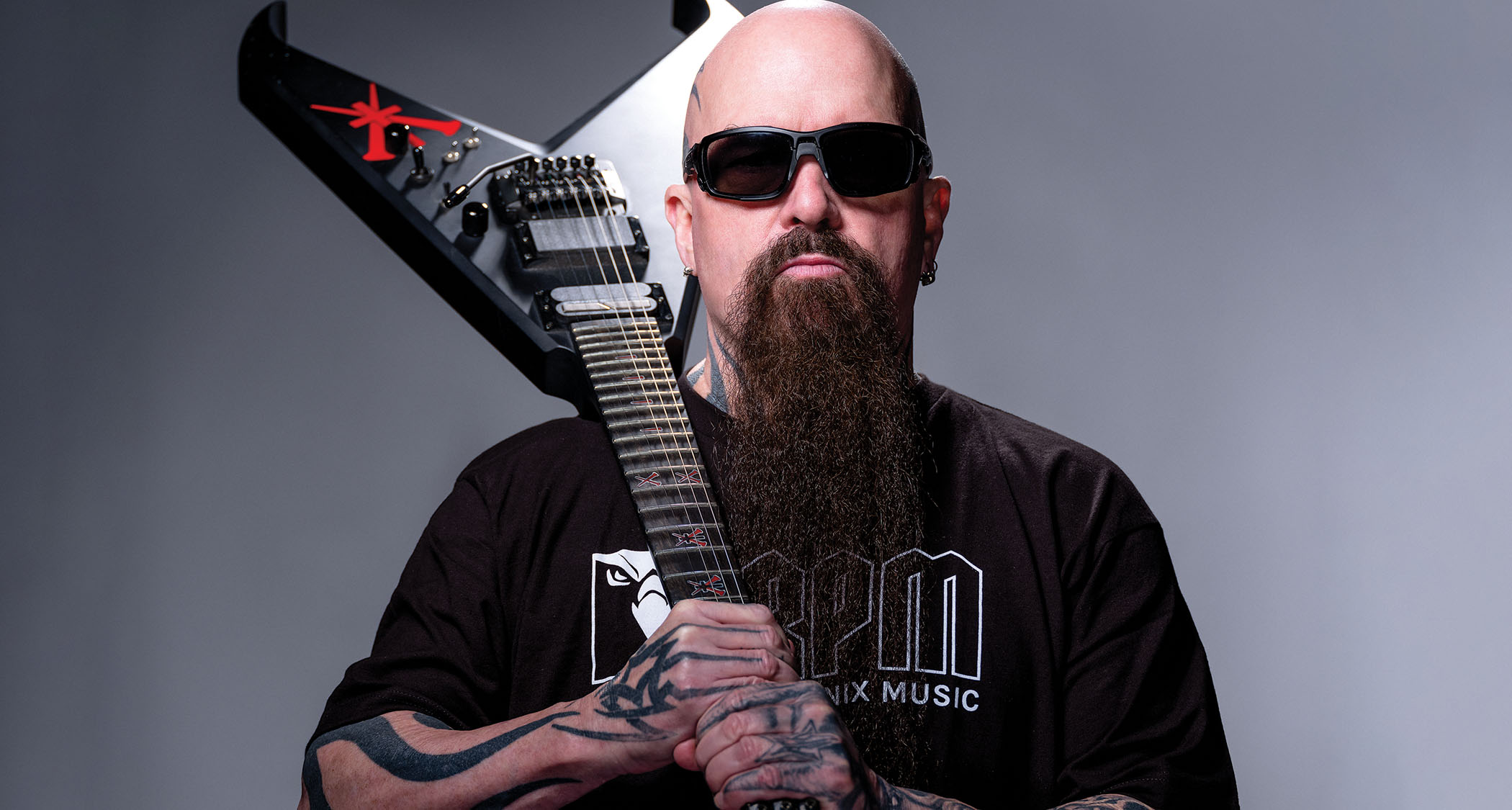
“I’m not looking to do any more music with Slayer at all,” he reiterates, “Not because of any dislike, but because we made that statement that we’re not going to tour anymore. And since we’re not touring, I don’t see any point in putting out a record especially since I’ve already got my own new avenue to do that, and I love it. I’m just getting started, and it’s going to be a super-fun time for hopefully 10, 15 years to come.”
Slayer have always been associated with the West Coast. Do you prefer being in New York, or are all big cities the same?
“I’ve always liked New York, and I’ve probably been here more than any other city in the world. The silly thing about ‘West Coast Kerry’ was I never paid attention to anything going on around me. I didn’t know what was right down the street. I’d heard of places, but I couldn’t tell you where they were.
“Now I’ve got a handle on where everything is in my Manhattan kingdom, so I get out a lot, whereas before I hardly ever went out. Our place is six blocks from the Freedom Tower, so we’re next to almost every subway line, and it’s easy to get around. We do a lot of walking now, too. But I got a system. Every time you gotta hit the bathroom, you just go into a bar, have a shot, use the bathroom and move on.”
Do you go out more in New York than you went out in California?
“I live out. In LA, when you’re in the suburbs you don’t get out that much because five restaurants only go so far before you start doubling up and your wife gets tired of it. My wife’s a foodie, so New York is great.”
You can only eat for so many hours of the day. That must leave lots of time to write music.
“I worked really hard on this record, but we recorded it really quickly. We did it in two weeks at Henson Studios in Hollywood. Josh Wilbur produced, so when we wanted to go in and fix a vocal here or there or do some tinkering, we did it at his studio at his house.
“So, 90 to 95 percent was done in the studio and the rest was done with Josh in his garage. We were done on my anniversary last year, April 29, so I flew home. After that, it became a waiting game.”
Were any full songs on From Hell I Rise left over from Slayer?
“From Hell I Rise and Rage were left over from Repentless. That said, some other riffs from those days ended up on this. I wrote the intro for Toxic five minutes before a Slayer show. We were getting ready to go onstage, and I came up with this riff and I didn’t want to forget it. I went and got my phone, recorded the part and then played the show.
“Another four songs for my next album are left over from Repentless, plus there’s a bunch of stuff that I had left over from this album that will go on it. Me and Paul are already rehearsing stuff for that record, too. So we’re still working.”
For a long time, I considered Gary. I love Gary. The reason I didn’t ask Gary is because the more elements I have from Slayer, the more detractors are going to say, ‘Oh, it’s Baby Slayer’
Did you write the songs using an amp modeler and a home-studio DAW with a drum program before you sent them to Paul?
“Dude, I don’t understand any of that shit. It’s like you’re talking alien to me. I hit record on my iPhone and stick it in front of my little speaker. My amp is about as big as my boot, and it sounds great.
“I put it maybe six feet away, play my song and then hit stop. And that’s what Paul gets. I send him a drum chart with time signatures for where the changes go, and what the drums are gonna do. So he already knows what I want before we get together. Nine times out of 10 we can play it within five minutes.”
Many fans assumed Gary Holt would be in your new band.
“For a long time, I considered Gary. I love Gary. The reason I didn’t ask Gary is because the more elements I have from Slayer, the more detractors are going to say, ‘Oh, it’s Baby Slayer’ or ‘Slayer Jr.’ So, the only piece of Slayer I took is Paul.
“I was gonna use Terry Date to produce. But, again, it’s the same situation, so I asked Josh Wilbur, who was great. I had to take all the Slayer pieces away, so when people say what they say, I can say, ‘No man, this is just me. I wrote everything myself, and if that is not a testament to how I sound, then nothing is.’”
Why did you handpick Phil?
“I think Phil handpicked me. He filled in for Gary in Europe when Gary had to drop off the tour when his dad was dying. I didn’t even think of Phil. When I’m in a given location I’ll think of players from the area. I was in Europe, and everybody I was coming up with didn’t want to do it or couldn’t do it. And then Paul says, ‘What about Demmel?’ And I’m like, ‘You know, that never even occurred to me.’ And I love Machine Head.
“The timing was great because I contacted him two days after he quit Machine Head, so he was available, and he was able to come out early and watch our tour before Gary flew home. So Phil got the tempo of the show and played along on the sidelines, and then he played our last four shows. When he was out there, he made sure I knew he wanted to be part of my future. I kept that in the back of my mind. When it was time to get a second guitarist, I called him up.”
Did you play all the rhythms on the album?
“I recorded everything since I wrote all the songs. It was easier that way. I recorded one track on the left and one on the right, but I used different guitars for different tracks so they would sound slightly different.
“In Slayer, when Jeff was still in the band and I did [the second track of guitar rhythms] on songs he wrote, I would use Jeff’s guitar. So, any nuances from his rig or his guitar would still come through, even though I was playing it.”
Jeff’s eerie, minor-key, tritone-filled licks and blinding chromatic riffs were Slayer trademarks. Did you try to write any parts in the style of Jeff to make From Hell I Rise sound more like Slayer, or is that overthinking the process?
“That’s overthinking things. It didn’t occur to me once to write like Jeff. This is me. But I played Jeff’s songs and he played my songs for so long that our styles became kind of integrated. A lot of people don’t realize that in the early days of Slayer, Jeff and I wrote a lot together.
“It was only after he moved a distance away that we each wrote our own stuff because the commute sucked and that made it harder to get together. The last song we wrote together was Disciple.”
Are you going to play any of Jeff’s songs on tour?
“Well, I’m going to play some Slayer songs, of course. Our set is gonna be over 45 minutes, and that’s all the material I got. So, I’m gonna concentrate on doing songs I wrote completely in Slayer, and songs I had a part in writing. I really don’t want people to say, ‘Oh, he was playing Jeff’s songs.’ If you give anybody a chance to complain about something, they will.”
Phil killed it when he came in and played
Was there a point in the creative process when everything came together?
“I think it started really feeling like an album when I started getting vocals on it, ‘cause then you’ve got these full songs. The first time you play the riffs with drums, it starts to take shape. You get goosebumps and say, ‘Oh, I know what this is gonna sound like!’ And then whether I put Mark Osegueda’s vocals on it or mine which I did for a long time before we had Mark the song really starts to take shape.”
Phil Demmel has a different lead style from Gary Holt. Did you want Phil’s leads to sound like Gary’s or even Jeff’s?
“I wanted Phil to do his own leads, but he was very conscientious about what he played. A couple times, he said, ‘If that’s too melodic, I can change it.’ I’m like, ‘Dude, it’s your lead. I want you to be happy with it. You may not have been able to contribute to the songs, but I want you to be able to be proud of what you did and what you made up.’ And he killed it when he came in and played.”
Do you and Phil play together differently than you and Gary? What’s the chemistry like between you two?
“We play a little different, but it works. We did this harmony guitar part [for Crucifixation], which was fun. He said, ‘I may have just the part for a double lead, if you’re into it?’ He wasn’t sure I’d want to hear it because he didn’t know how totalitarian I wanted to be about it. But I’m like, ‘Dude, I’m into hearing anything.’
I firmly believe that if there are ideas out there and you don’t hear them you might be missing out on the best song ever
“I firmly believe that if there are ideas out there and you don’t hear them you might be missing out on the best song ever. So he showed me what he was doing, and I’m like, ‘Fuck, yeah. Show me how to do it and I’ll play it.’ And that’s what you hear.
“I plan on doing more stuff like that with him. I wanted us to do a really fast back-and-forth Slayer-style thing like on Angel of Death. ‘You make noise, I’ll make noise, then vice-versa.’ It didn’t happen, but maybe next time.”
Did you pre-write your leads or improvise them like you often did with Slayer?
“I went out of my way for my leads, and I actually had time to construct them. I wasn’t finishing up lyrics and coaching Tom [Araya], like in the past [with Slayer]. I’d say at least 80 percent of my leads and fills were thought out. A lot of them are structured, but I still had my whammy sections where I fuck off and do what I do.
“When we finished the record, I realized I had so many more leads than Phil. I wanted it to be more 50/50, but I counted mine and I did 18. The last one was for Tension, and I actually made that up in my hotel room while we were recording, but it’s one of my favorites. It’s super complete. It fits that section and matches the mood of the song. Phil really complimented me. He said these are the best leads I’ve ever done.”
As a lead guitarist, are you well-versed in scales?
“[Laughs] I know major and minor. That’s about it. And whatever I do in between is usually minor because that’s what sounds wickedest. Then there’s, ‘Fuck the scales. Let’s just make crazy-ass whammy noises on this one’ ’cause that’s part of the Slayer sound.”
There were rumors your new band was going to be called KFK. You mentioned you considered Blood Rain and King’s Reign, but there were trademark issues. Why didn’t you want to put this out as a solo album from the get-go?
“I never wanted to reference my name at all. I’m not a vain person. And anybody that knows me knows that. I wanted this to be a band, not a solo project. At the end of the day, could I have bought the trademark for Blood Reign or King’s Rain? Yeah, probably.
“But the festivals I was booked for in May were getting announced, and we had to go with something. So we used my name. The logo with the two “K”s (one forward, one backward) worked with the [inverted] cross that I wanted in the logo.
“I’m still thinking about changing it, but if we get too much further down the road, that window’s gonna shut. I don’t know. My wife always tells me to use KFK. Somebody else will say, ‘Kerry King is cool!’ And I love the logo. So, it’s being seen right now as Kerry King with the logo. I would like to keep the logo, but with a band name. But every time I come up with something, no matter how obscure I think it is, it’s taken. That goes for the album title, too.”
What other record names were you considering?
“Originally, I thought of From Hell I Rise. Then I wrote Idle Hands, and I’m like, ‘Oh, Idle Hands. That’s a good name for the record.’ Then I wrote Crucifixation. I’m like, ‘Dude, this song’s fucked up. I love it. Let’s call it Crucifixation. I looked online and there’s eight other uses of Crucifixation. And I went, ‘Son of a bitch, man!’ I thought for sure. I made that one up. So we went back to From Hell I Rise.”
It’s clear that you wanted Slayer to continue making records and touring, but Tom wanted to spend more time with his family. So Slayer broke up pretty near the top of its game. The last New York show at Madison Square Garden was skull-rattling, and other gigs were equally powerful. How were you able to continue generating such ferocious energy, knowing that the band was about to break up?
“I always loved doing Slayer, so I cherished it up until the end. During the last 18 months, we hit every place that wanted us to come, so we could go there at least once. We were killing it in those last rounds, even Tom. He sounded so great. I went in and told him he sounded great. And he was polite and all. And, you know, there’s something to be said for going out on top. It’s like we were in the Super Bowl. I felt kind of like Peyton Manning. We went out on such a high note and then said, ‘Hey, we’re done.’”
Were you the first to find out Tom was leaving?
He told me about two years before the end, which was months before he told the other guys. We were at a photo session, and I turned to Tom and said, ‘Listen, dude. If you don’t tell these guys, I’m not gonna do the photo session because they deserve to know.’ That’s how they found out.
“I told both Paul and Gary, I said, ‘I got a spot for both of you in my next project.’ And then from that point on, it just kind of evolved into where it is now. Me and Gary never discussed him playing. We never discussed him not playing. It just kind of happened this way.”
This is the first record I haven’t played bass on, probably, since the '90s
When you saw how great the farewell shows were going, did you ever try to convince Tom to stay in the band? Or did he ever think about changing his mind along the way?
“I don’t think he thought of changing his mind along the way. I don’t know, because we didn’t talk much, and we never talked about that. I don’t think it would have been a bad idea because every day we’ve been away, I’ve missed Slayer.
“But if somebody’s come to a point where they don’t want to do something anymore, and you’re trying to talk ’em into it, it seems to me that there’s a really big chance you’re gonna get to the point where they’re just mailing it in. And I don’t want to be perceived as somebody that mailed it in.”
Did Tom ever get to that point?
“Not at the end. I remember, a long time ago I read a review where the writer said me and somebody else were on fire, but the other two mailed it in, and it bummed me out. I never wanted Slayer to be that. Tom just came to the point where he was done, and if we tried to keep going with no endpoint, we would have been setting ourselves up for failure. Even if we succeed in talking that guy into staying, to me, it just doesn’t have the chance to be as good.”
As bittersweet as it was to end Slayer, doing this solo album and having complete control of everything must be rewarding in its own way. You don’t have to negotiate with bandmates or play band politics.
“It’s refreshing. I never wanted it. It’s not something I needed musically. It’s not something I needed personally. Having it was super cool and super fun, and working with new people was super fun. This is the first record I haven’t played bass on, probably, since the Nineties.”
Why did he stop playing bass guitar on the albums?
“We would always let Tom play bass until he got tired of not being good at it. In Tom’s defense, up to that point, he had never played the songs. It was always just me and Paul going through ’em. And then we get in the studio, it’s time to record. I think Tom’s got it in his head that he’s gonna be able to pull it off. But for anybody that’s never played a song before, to come in without knowing the music and get it up to recording level is not realistic.
“So, if I’ve already done my guitar tracks, Jeff’s done his guitar tracks, And Tom doesn’t know the bass parts, I can pick up a bass and get it done in less than a day ’cause I already know the songs. It got to where he’d mess around and play one song for eight hours before he got frustrated and just said, ‘Here, you do it!’ I don’t want anybody to think for a second that he couldn’t do it if he had the time to learn it.”
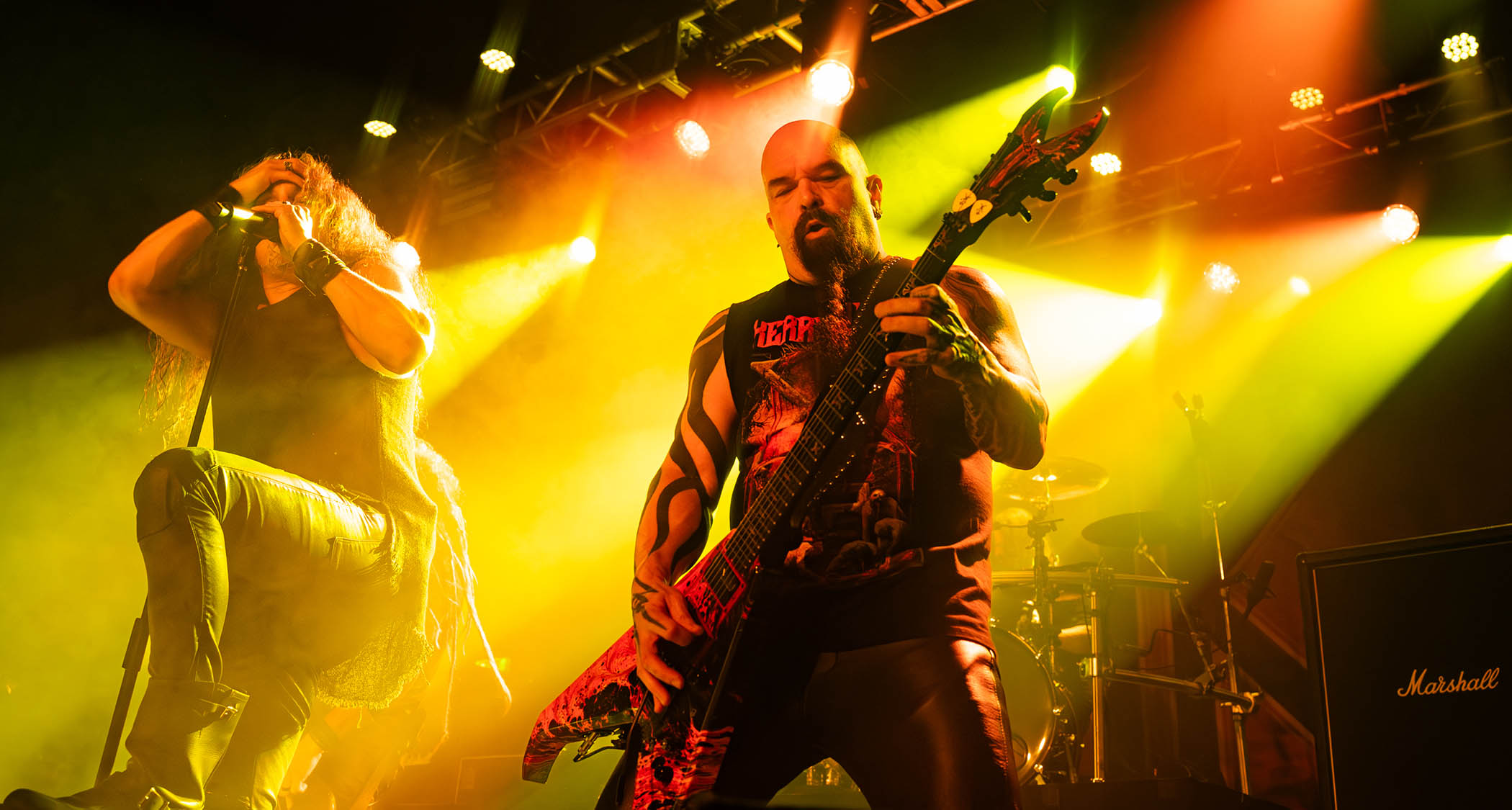
Hellyeah bassist Kyle Sanders played bass on the album. How did you know him, and was it a relief to have someone else playing bass in the studio for your songs?
“I was good friends with Dime and Vinnie. We played with Hellyeah in 2015, then we hung out with Kyle, and he was cool. I didn’t know I was gonna need a band then, but he’s the only bassist that came to mind. Had he been busy or couldn’t have done it, I could have come up with number two, but it never got that far.
I just think being alive in this stupid world we’re living in that gives you enough fury for 10 lifetimes
“I sent Kyle four songs, and he sent them back two days later with his bass parts. I went, ‘Hmm, that’s never happened in my life.’ And he’s a real bassist so he came up with stuff I probably wouldn’t have thought of. So, it was cool.”
Some people mellow with age. You’re not trashing hotels anymore, but it doesn’t seem like the fire within has cooled. Are you still as angry as you were in the Nineties?
“Man, I don’t feel any different than when I was 18. I’ve always had music to cope with anger. But I just think being alive in this stupid world we’re living in that gives you enough fury for 10 lifetimes. I’m not gonna talk politics because I’m not into that. But there’s so much that’s fucked up about the world today.”
Slayer were a gateway to death metal for tons of bands. Were you a fan of Morbid Angel and Cannibal Corpse? And did you ever think of taking a toe-dip into the murky swamp of extreme metal?
“Do I feel like we were a stepping stone to that? Absolutely. Fuck, yeah! But it’s not my forte. I think where we teeter is on the fine line between thrash and death metal. And that’s as far as we want to go. I mean, are they edgier? Maybe. Are they doomier? Probably.
“A lot of bands have been influenced by our music and taken it to where they want to be, and that’s fine. I don’t want to be heavier. I don’t want to be faster. I don’t want to have more growly vocals. I love what we’ve done. And I want to keep doing it with my new band.”
- From Hell I Rise is out now via Reigning Phoenix.
Jon is an author, journalist, and podcaster who recently wrote and hosted the first 12-episode season of the acclaimed Backstaged: The Devil in Metal, an exclusive from Diversion Podcasts/iHeart. He is also the primary author of the popular Louder Than Hell: The Definitive Oral History of Metal and the sole author of Raising Hell: Backstage Tales From the Lives of Metal Legends. In addition, he co-wrote I'm the Man: The Story of That Guy From Anthrax (with Scott Ian), Ministry: The Lost Gospels According to Al Jourgensen (with Al Jourgensen), and My Riot: Agnostic Front, Grit, Guts & Glory (with Roger Miret). Wiederhorn has worked on staff as an associate editor for Rolling Stone, Executive Editor of Guitar Magazine, and senior writer for MTV News. His work has also appeared in Spin, Entertainment Weekly, Yahoo.com, Revolver, Inked, Loudwire.com and other publications and websites.















